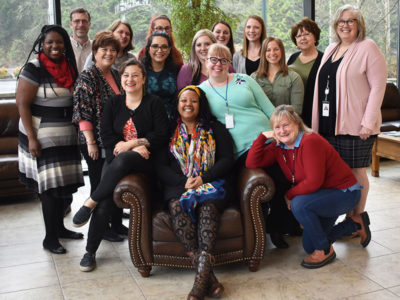Sexual Assault Nurse Examiner Best Practices Recently, the Office of Crime Victims Advocacy (OCVA) collaborated with researcher and writer Austin Scharff to produce a report to the legislator entitled Sexual Assault Response: Increasing Sexual Assault Nurse Examiner Availability and Access Statewide (2018). The report includes statewide-standardized terminology, hospital response models and maps of hospitals offering sexual assault forensic exams. Importantly, the report contains policy recommendations for the state legislature (p.…
Domestic Violence Awareness and Prevention – October 2019l SafePlaceFor the month of October, SafePlace collaborated with Equal Latin. Click on this slide to read more.Click HereEmergency Support Shelter – CowlitzAnnual Candlelight Vigil – Click on this slide to read more.Click HereYWCA of Clark CountyDomestic Violence 101 – Click this slide to read moreClick HereWashingtonton State Coalition Against Domestic ViolenceClick this slide to read about WSCADV activitiesClick HerePrograms for Peaceful LivingPurple…
Privacy and confidentiality are core to the provision of victim services, and it is important that service providers are maintaining an infrastructure that supports this confidentiality. In alignment with this value, the Federal funding that OCVA administers through the Office on Violence Against Women (OVW) and the Office for Victims of Crime (OVC) has a new funding requirement that all grantees must have a procedure in place in the event…
Join the Washington State Coalition Against Domestic Violence at its annual conference…And Justice For All! During the 26th year of this conference, WSCADV has a variety of workshops and guest speakers. Topics covered include prevention, advocacy, management, trauma-informed practices, economic justice, housing first, vicarious trauma, murdered and missing indigenous women and many more! Plenary speakers include: Kirsten Harris Talley, Progress Alliance of Washington Tarra Simmons, Public Defender Association Theryn Kigvamasudvashti,…
Applications were requested from victim service providers for addressing unmet victim service needs. Funding where current services are unavailable or inadequate was the priority. Federal VOCA victim assistance funds support, extend and enhance services to victims of crime. This includes services that: Respond to the emotional, psychological, or physical needs of crime victims Assist victims to stabilize their lives after victimization Assist victims to understand and participate in the civil…
In June 2018, the Washington state legislature passed into effect the Safety and Access for Immigrant Victims Act (RCW 7.98), regarding U visa certifications and T visa declarations. Through this legislation, certifying agencies (identified as law enforcement agencies, prosecutors, administrative judges, hearing offices, or other authorities that have responsibility for the investigation and prosecution of criminal activity) to: Designate a certifying official within their respective agency; Respond to U and…
First thing is to extend a huge thank you to everyone that participated in the InfoNet Survey. Within the first 24 hours, there were a lot of responses. Over the next couple of weeks, there were responses from 64% of the agencies using InfoNet. 61 % of the agencies responding to the survey report they are using data collection systems required by other funders in addition to InfoNet.
Sexual Assault Awareness & Child Abuse Awareness Month in Review Connections, a Center for Healthy FamiliesClick on the link to see all the activities at Connections, or scroll down to browse through the pictures and activities of 9 agencies.ClickPartners with Families and Children Children’s Advocacy CenterClick on the link to see all the activities at Partners with Families and Children’s Advocacy Center, or scroll down to browse through the pictures…
OCVA is excited about the folks that have recently joined our team, and we wanted to take this opportunity to share a bit about them with you. We asked each of our new(er) staff members a few random questions, and the results are pretty great. Please join us in welcoming each of them! Alissa Greenwald Victims of Crime Team Program Coordinator What I do: Manage grants and provide technical assistance…
Spring is here and it is time for the Washington Coalition of Sexual Assault Programs’ Annual Conference! WCSAP always hosts an excellent array of workshops and guest speakers and this year is no exception. WCSAP staff have been hard at work bringing in folks from around the country to talk about prevention, advocacy, management, child sexual abuse, therapy and people of color leadership. The featured plenary speaker is Mira Yusef…



